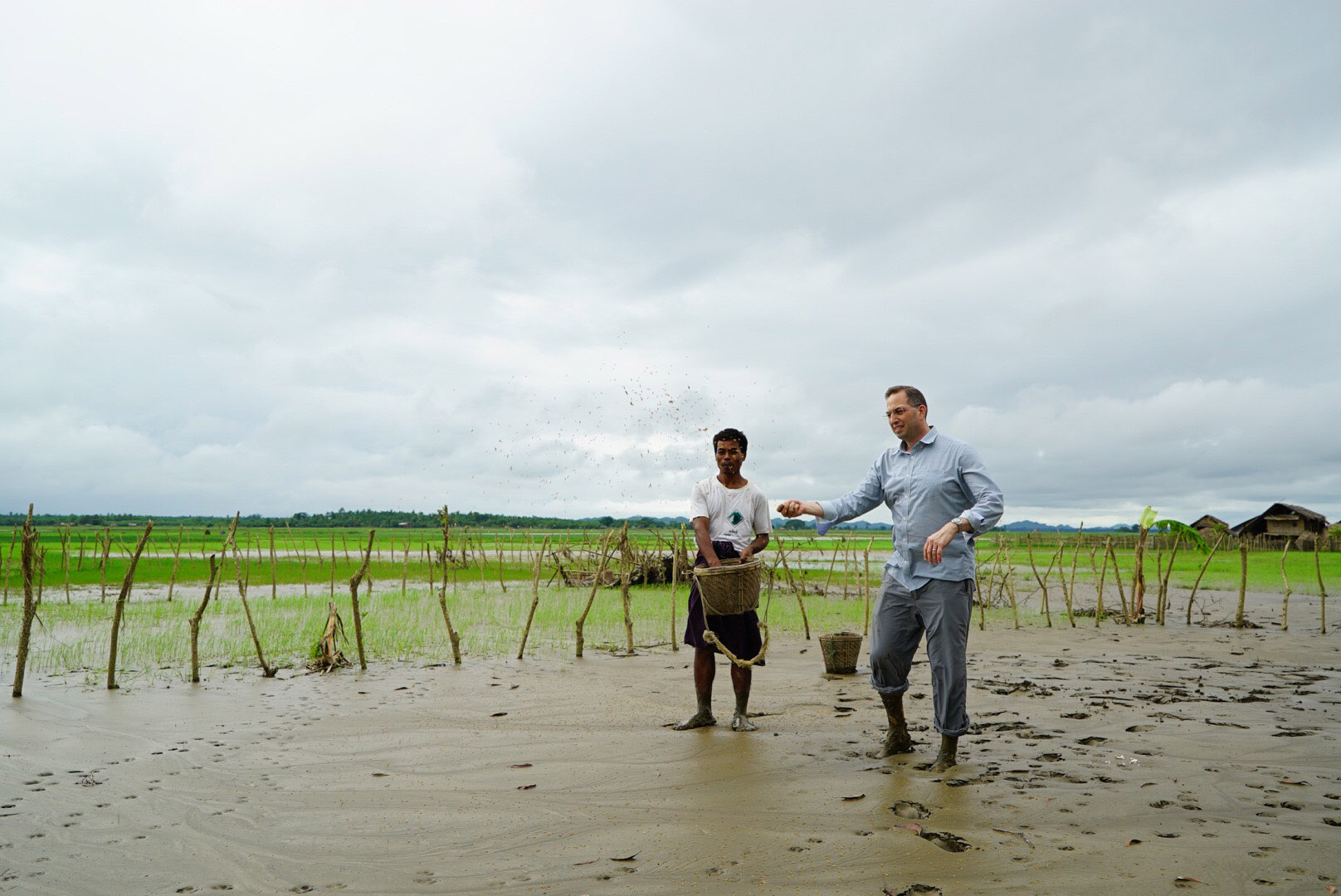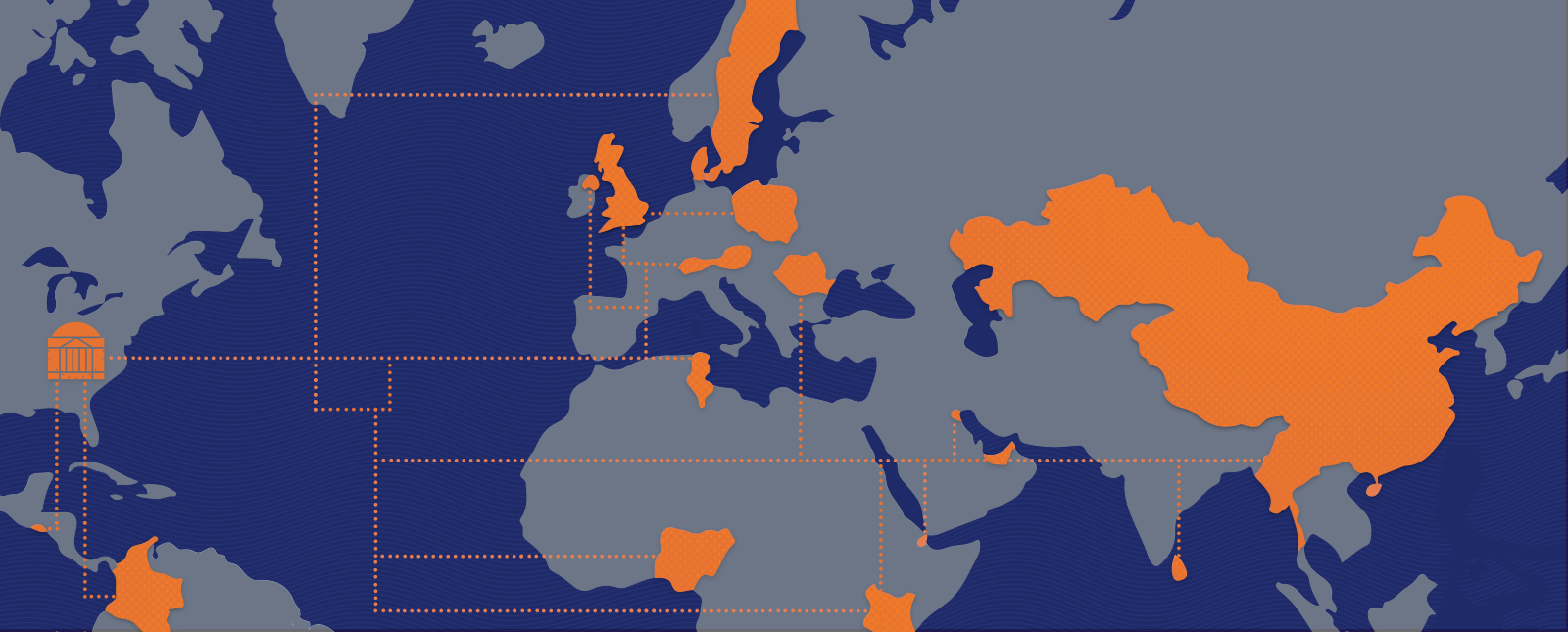Wahoos traveling in Mandalay, Burma, will feel immediately welcomed by these words: “For here we are not afraid to follow truth wherever it may lead, nor to tolerate error so long as reason is left free to combat it.”
Those are the words Thomas Jefferson used to describe his vision for the University of Virginia in a Dec. 27, 1820 letter to English historian William Roscoe.
The famous Thomas Jefferson quote welcomes visitors to Burma’s Jefferson Center, a library that occupies the former United States consulate in Mandalay. The proclamation’s placement is no accident.
“I early on made sure to add a Jefferson/UVA touch that fits well with the ethic o f the center and of our engagement with Burma in general,” said Derek Mitchell, U.S. ambassador to the East Asian nation.
Mitchell is a proud member of the Class of 1986. His first job after graduation was as an assistant in the foreign policy office of Sen. Edward Kennedy.
The foreign affairs major is one of a host of UVA graduates who have entered the Foreign Service. It is difficult to know precisely how many diplomats Jefferson’s University has produced. University historian Alexander G. “Sandy” Gilliam Jr. said UVA has supplied ambassadors since the earliest days of the republic and “currently, more Foreign Service officers are alumni of the University than of any other university.”
The United States began naming ambassadors and consuls in 1798 and merged the Diplomatic and Consular Services into a unified Foreign Service in 1924. An estimated 20,000 people apply annually and 1 to 2 percent are hired, depending on funding at the State Department.

U.S. Ambassador to Burma Derek Mitchell helps a rice farmer, whose crop was destroyed in the July-August floods, to replant rice seeds. Rakhine State, Burma, August 2015. (Photo courtesy of Mitchell)
Appointed in 2012, Mitchell has been the United States’ point person in Burma during a historic time. In November, the nation – also known as Myanmar – held general elections that have effectively placed iconic opposition leader Aung San Suu Kyi in power.
“The most important issue at the moment is to ensure a smooth transition of power … and then ensure our two countries continue building mutual trust after years of alienation during Burma’s long era of military rule,” Mitchell said.
The two countries enjoy good relations. “We just need to continue, and enhance, the good faith engagement and outreach, including assisting with educational opportunities for young people from around the highly diverse country who have been denied such opportunities for so long.”

“It is a high calling, and an enormous challenge to do well, which makes the job even more appealing to me,” said Mitchell, pictured here attending the opening ceremony for Buddhist school Sitagu Sotujana University outside of Rangoon, Burma, February 201
“UVA enabled me to interact with leading public policy professionals and reduce the mystery that surrounds policymaking,” he said. “UVA’s Jefferson connection also firmly implanted in me the importance of public service, and of our founding democratic values.”
Coincidentally, “I am ably supported in my embassy by two other illustrious Wahoo alumni who also majored in foreign affairs,” Mitchell wrote. Michael Quinzio, Class of 2005, drives the office’s social media efforts, boosting its Facebook followers from about 70,000 in 2014 to 600,000 today; Lea Rivera, Class of 2001, is the lead consular officer, responsible for protecting American citizens in Burma and overseeing the complex visa issuance process for Burmese citizens.
Meanwhile, in South America …
Like Burma, Colombia is also at a historic crossroads. The rebel group FARC is closer than ever to striking a peace deal with the Colombian government to end decades of conflict. Washington’s envoy in Bogota is Kevin Whitaker, a member of UVA’s Class of 1979.

U.S Ambassador to Colombia Kevin Whitaker is greeted by children at Campo Hermoso in the Colombian department of Caquetá, during his recent visit to USAID projects in the area. (Photo curtesy of U.S. Embassy in Colombia)
He “deserves enormous credit for insisting on a negotiated settlement to this 52-year conflict,” Whitaker wrote from South America. “The safer path politically would have been to continue the war. He and his team came up with a well-designed process focused on political participation, drugs, agrarian reform, victims, and end of conflict.” (Santos visited UVA in 2013 and discussed the peace process in the Dome Room.)
Whitaker said the first three matters are largely settled, “but victims – or ‘transitional justice’ – how to deal with the many violations of international humanitarian law which occurred in the conflict – remains.”
Appointed in 2014, Whitaker said he is “incredibly proud” to be serving in Colombia and realized as an undergraduate history major that he wanted a career in international affairs.
He recalls two professors who had a profound impact because of their rigor, intellect, humor and commitment to students: “Harry Dell of the history department, who explained how what happened in ancient Greece and Rome thousands of years ago serve as archetypes even today; and Whittle Johnston in international relations, who explained the Congress of Vienna and the balance of power system that followed with a clarity and integrity that I found captivating,” he wrote.
Both Mitchell and Whitaker say they loved their time at UVA. Mitchell held down the graveyard shift, spinning records at WUVA. For Whitaker, Alderman Library holds warm memories. Literally.
“I remember working at Alderman Library, cataloging books, on blistering hot summer days,” he said. “There was something monkish about it that connected me profoundly to the academic life and to the ineffable rhythm of the University.”
Current Wahoo diplomats include:
Chris Andino, Political Chief at the U.S. Embassy in Panama, Class of 2003
Robert F. Godec Jr., U.S. Ambassador to Kenya, Class of 1979
Clifford A. Hart Jr., U.S. Consul General to Hong Kong & Macau, Class of 1983
Atul Keshap, U.S. Ambassador to Sri Lanka and Maldives, Class of 1992
Barbara A. Leaf, U.S. Ambassador to United Arab Emirates, Class of 1989
Deborah R. Malac, U.S. Ambassador to Liberia, Class of 1981
Deborah A. McCarthy, U.S. Ambassador to Lithuania, Class of 1976
Joan A. Polaschik, U.S. Ambassador to Algeria, Class of 1991
Media Contact
Article Information
January 4, 2016
/content/how-i-became-ambassador-two-alumni-turned-diplomats-share-their-stories

